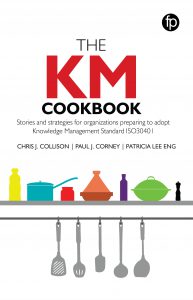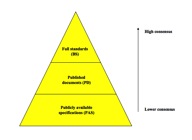Stop press: 4 February 19
Today Chris Collison handed over the first iteration of the manuscript to Facet Publishing. The countdown begins to the May publication date.
——
The past 3 months have been hectic as Chris Collison, Patricia Eng and I raced to meet a publisher deadline of 31st January. I’ve enjoyed the discipline of conducting interviews and turning them into chapters that showcase their KM activities.
I’ve also enjoyed working virtually as a team even though bandwidth in Chile and at some airports can be a challenge (Patricia is touring South America and Chris spends more time on planes than I do).
It all begun over dinner as most good things do. Having run a joint Masterclass in Lisbon in May 2017 Chris Collison and I were sitting in a restaurant overlooking the River Tejo supping a wonderful Alentejo Red wine enjoying Arroz do Marisco (Portuguese Paella).
Over the next 6 months we had a number of discussions culminating in a decision to go ahead and write a book using the release of the ISO KM Standards as a backdrop.
A book that makes no promise to help the reader ‘pass’ an assessment, more one that draws on great examples from leading global organisations and highlights aspects from their KM Programmes others might find inspirational.
I’ve learned so much during this time and could not have wished for a more varied group of organisations to interview:
- PROCERGS of Brasil
- MAPNA of Iran
- Saudi Aramco of Saudi Arabia
- Petroleum Development Oman
- Dstl (Defence Science & Technology Labs) of the UK
- Transport for London of the UK
- Financial Conduct Authority of the UK
- TechnipFMC of the US, UK and France
There have been so many interesting stories and reassuringly endorsement of the importance of the “8 ‘ates (soft skills essential for KIM’ers) I’ve spoken about and led masterclasses on. It’s also been interesting to learn that one organisation has aligned it’s own KM consultancy effort to the new ISO 30401 KM standard.
Introducing the book
The KM Cookbook serves up a menu of success stories and strategies for organizations wanting to know more about Knowledge Management Standard ISO30401 – whether they intend to pursue certification, or simply seek to use it as a framework to review their existing programme and strategy.
Knowledge Management (KM) has been around for over 20 years as a set of tools and methods for connecting, collecting and creating knowledge. Lots has been written, and there are tens of thousands of practitioners out there—in-company specialists and consultants. Unlike Lean, Agile and other business improvement methodologies, KM has never had a single agreed set of tools, or a commercial accreditation or standard. Attending a KM conference can feel a bit like visiting an international street food market!
In many ways, the arrival of an internationally agreed standard and vocabulary, imbues fresh professional credibility and to the field of Knowledge Management. It provides knowledge managers with a ‘brand-new kitchen’, and a moment during which they can pause for a moment and consider the service that they provide to their organisations.
Why a Cookbook?
For a potential restauranteur who has gone beyond casual street-food and is looking to sell a service to customers, the challenge – and the opportunity – is to provide a distinctive offering with consistency and professionalism. To do that successfully requires a number of elements: credible reputation, premises, staff, tasty and appealing menus and recipes, compliance with relevant food hygiene standards, and, of course, blood, sweat and tears. And at the heart of it all, with its appliances, utensils and food stocks, is the restaurant kitchen.
In the KM Cookb ook, we use the metaphor of the restaurant, its cuisine, owner, chef, staff, ingredients, menu-planners, customers – and a restaurant critic to serve up ISO30401 on a plate for the readers. The second half of the book explores sixteen different examples of KM in practice, through the words of their ‘KM chefs’.
ook, we use the metaphor of the restaurant, its cuisine, owner, chef, staff, ingredients, menu-planners, customers – and a restaurant critic to serve up ISO30401 on a plate for the readers. The second half of the book explores sixteen different examples of KM in practice, through the words of their ‘KM chefs’.
Imagine you had the opportunity, not just to enjoy a new, well-equipped and fully inspected kitchen – but also the chance to sit down with KM ‘chefs’ from around the world, across different industry sectors and listen to their stories. That’s exactly what we have set out to do with the KM Cookbook.
Who we’ve written it for
Our aim has been to produce a highly readable, slightly tongue-in-cheek dinner companion for a wide readership. We hope anyone looking to see how Knowledge Management can make a difference to their business will enjoy this as a good read and that KIM Professionals, Senior Management, Quality Management and Human Resource Professionals will find much of specific interest to them.
Agreeing a framework and table of contents took time; we narrowed down the immediate target audience to:
- Senior Management: trying to decide whether to adopt the standards
- Practitioners: tasked with implementing the standards and remaining compliant
- Assessors: who will assess organisational KM activity against the standards to help them understand KM
Draw up a chair – we hope you’re hungry!


